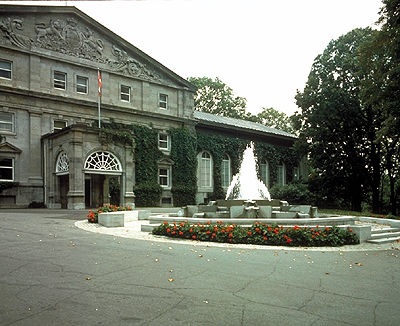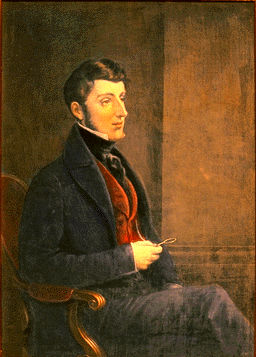Browse "Government"
-
Article
Regional Government
Regional government is a structure created by the provinces, in particular Ontario, Québec and British Columbia, by which municipalities are grouped under a regional political and administrative structure.
"https://development.thecanadianencyclopedia.ca/images/tce_placeholder.jpg?v=e9dca980c9bdb3aa11e832e7ea94f5d9" // resources/views/front/categories/view.blade.php
https://development.thecanadianencyclopedia.ca/images/tce_placeholder.jpg?v=e9dca980c9bdb3aa11e832e7ea94f5d9
-
Article
Rep by Pop
Representation by population is a political system in which seats in a legislature are allocated on the basis of population. It upholds a basic principle of parliamentary democracy that all votes should be counted equally. Representation by population was a deeply divisive issue among politicians in the Province of Canada (1841–67). Nicknamed “rep by pop,” it became an important consideration in the lead up to Confederation. (See also: Representative Government; Responsible Government.)
"https://d2ttikhf7xbzbs.cloudfront.net/media/media/bf6a8447-8306-4749-bb63-2f6129eb20a6.jpg" // resources/views/front/categories/view.blade.php
https://d2ttikhf7xbzbs.cloudfront.net/media/media/bf6a8447-8306-4749-bb63-2f6129eb20a6.jpg
-
Article
Rep by Pop (Plain-Language Summary)
Representation by population (or “rep by pop”) is a political system. It is when seats in a legislature are assigned based on population. This upholds a basic idea of democracy that all votes should be counted equally. Rep by pop was a deeply divisive issue in the Province of Canada (1841–67). It became an important factor in Confederation. This article is a plain-language summary of Rep by Pop. If you would like to read about this topic in more depth, please see our full-length entry: Rep by Pop.
"https://d2ttikhf7xbzbs.cloudfront.net/media/media/bf6a8447-8306-4749-bb63-2f6129eb20a6.jpg" // resources/views/front/categories/view.blade.php
https://d2ttikhf7xbzbs.cloudfront.net/media/media/bf6a8447-8306-4749-bb63-2f6129eb20a6.jpg
-
Article
Representative Government
Representative government is a political system in which an elected assembly governs. Members of the assembly act as the people's representatives in government.
"https://d2ttikhf7xbzbs.cloudfront.net/media/media/b82af0bf-c28c-4f44-be97-09df6c7f769a.jpg" // resources/views/front/categories/view.blade.php
https://d2ttikhf7xbzbs.cloudfront.net/media/media/b82af0bf-c28c-4f44-be97-09df6c7f769a.jpg
-
Article
Responsible Government
Responsible government refers to a government that is responsible to the people. In Canada, responsible government is an executive or Cabinet that depends on the support of an elected assembly, rather than a monarch or their representatives. A responsible government first appeared in Canada in the 1830s. It became an important part of Confederation. It is the method by which Canada achieved independence from Britain without revolution.
"https://d2ttikhf7xbzbs.cloudfront.net/media/media/ba6bdff6-574a-4697-ac95-afdcc5ddfcc9.jpg" // resources/views/front/categories/view.blade.php
https://d2ttikhf7xbzbs.cloudfront.net/media/media/ba6bdff6-574a-4697-ac95-afdcc5ddfcc9.jpg
-
Article
Rideau Hall
A sophisticated estate that incorporated the primary elements of English landscape style, Rideau Hall was thought to be in keeping with the stature and lifestyle of the Queen's representative in Canada.
"https://d2ttikhf7xbzbs.cloudfront.net/media/media/65601146-87c4-4c0a-9747-e9ea04708cd6.jpg" // resources/views/front/categories/view.blade.php
https://d2ttikhf7xbzbs.cloudfront.net/media/media/65601146-87c4-4c0a-9747-e9ea04708cd6.jpg
-
Article
Royal Commission Inquiry into Civil Rights
The Royal Commission Inquiry into Civil Rights was an investigation into the status of civil rights in Ontario. It was commissioned by the Government of Ontario in 1964. It was completed in 1971. Chaired by judge James Chalmers McRuer, it was also known as the McRuer Commission of 1971. Its final report totalled 2,281 pages and included 976 suggested legal reforms. The inquiry was highly influential. It prioritized ideas of fairness, accessibility and equity within the justice system. It also led to reforms in other branches of government to protect those principles. It was an important precursor to the Charter of Rights and Freedoms.
"https://d2ttikhf7xbzbs.cloudfront.net/Photograph_of_James_C._McRuer_16953287526.jpg" // resources/views/front/categories/view.blade.php
https://d2ttikhf7xbzbs.cloudfront.net/Photograph_of_James_C._McRuer_16953287526.jpg
-
Article
Secularism in Quebec
The Quiet Revolution (1960–1970) gave rise to secularism within Quebec society. The latter became both secular by widening the separation between Church and State, as well as non-confessional by removing religion from institutions. However, the issue of secularism is still a matter for debate. In June 2019, the passage of the Act Respecting the Laicity of the State fueled many discussions about the place of religion in public domain.
"https://d2ttikhf7xbzbs.cloudfront.net/media/new_article_images/Corridart/1059px-Pierre_Ayot,_La_croix_du_Mont-Royal_(réplique),_2016_(30216916871).jpg" // resources/views/front/categories/view.blade.php
https://d2ttikhf7xbzbs.cloudfront.net/media/new_article_images/Corridart/1059px-Pierre_Ayot,_La_croix_du_Mont-Royal_(réplique),_2016_(30216916871).jpg,_2016_(30216916871).jpg)
-
Macleans
Social Union Deal
Even Lucien Bouchard's glowering presence could not entirely sour the mood. In announcing a deal to overhaul the way Ottawa and the provinces work together on social programs, Prime Minister Jean Chrétien spoke proudly of "a new departure.This article was originally published in Maclean's Magazine on February 15, 1999
"https://development.thecanadianencyclopedia.ca/images/tce_placeholder.jpg?v=e9dca980c9bdb3aa11e832e7ea94f5d9" // resources/views/front/categories/view.blade.php
https://development.thecanadianencyclopedia.ca/images/tce_placeholder.jpg?v=e9dca980c9bdb3aa11e832e7ea94f5d9
-
Article
Socialism
Socialism is a political doctrine that criticizes the existence of social, economic and political inequality in society. Seeking to lessen class inequality, socialists call for a redistribution of power from the affluent owners to the working class.
"https://development.thecanadianencyclopedia.ca/images/tce_placeholder.jpg?v=e9dca980c9bdb3aa11e832e7ea94f5d9" // resources/views/front/categories/view.blade.php
https://development.thecanadianencyclopedia.ca/images/tce_placeholder.jpg?v=e9dca980c9bdb3aa11e832e7ea94f5d9
-
Article
Solidarity
In May 1983 British Columbians voted the Social Credit Party, headed by William BENNETT, into office. Two months later, on July 7, the Socreds introduced their so-called Restraint Budget, accompanied by 26 prospective bills.
"https://development.thecanadianencyclopedia.ca/images/tce_placeholder.jpg?v=e9dca980c9bdb3aa11e832e7ea94f5d9" // resources/views/front/categories/view.blade.php
https://development.thecanadianencyclopedia.ca/images/tce_placeholder.jpg?v=e9dca980c9bdb3aa11e832e7ea94f5d9
-
Article
Sovereign
Under Canada’s constitutional monarchy, the sovereign is head of state, the legal foundation of the executive branch of government and one part of Parliament — along with the Senate and House of Commons. The current sovereign of Canada is King Charles III. The sovereign is represented in Canada by the governor general, lieutenant-governors and territorial commissioners and acts on the advice of the prime minister, the head of government.
"https://d2ttikhf7xbzbs.cloudfront.net/KingCharlesIII.jpg" // resources/views/front/categories/view.blade.php
https://d2ttikhf7xbzbs.cloudfront.net/KingCharlesIII.jpg
-
Article
Sovereignty
Sovereignty is an abstract legal concept. It also has political, social and economic implications. In strictly legal terms, sovereignty describes the power of a state to govern itself and its subjects. In this sense, sovereignty is the highest source of the law. With Confederation and the passage of the British North America Act, 1867, Canada’s Parliament was still legally under the authority of the British Parliament. By 1949, Canada had become fully sovereign in relation to Great Britain. This was due to landmark legislation such as the Statute of Westminster (1931). The Constitution Act, 1982 swept away Britain’s leftover authority. Questions of sovereignty have also been raised by Indigenous peoples in Canada and by separatists in Quebec. The latter, for a time, championed the concept of sovereignty-association.
"https://d2ttikhf7xbzbs.cloudfront.net/media/media/39b78f3a-b1bb-47ec-aa0b-d4f5de005157.jpg" // resources/views/front/categories/view.blade.php
https://d2ttikhf7xbzbs.cloudfront.net/media/media/39b78f3a-b1bb-47ec-aa0b-d4f5de005157.jpg
-
Article
Special Council of Lower Canada (1838–1841)
Between 1838 and 1841, Lower Canada was governed by an “authoritarian” political body known as the Special Council.
"https://d2ttikhf7xbzbs.cloudfront.net/media/media/9b102db4-f93d-44c3-a26e-d61b3ea11b50.jpg" // resources/views/front/categories/view.blade.php
https://d2ttikhf7xbzbs.cloudfront.net/media/media/9b102db4-f93d-44c3-a26e-d61b3ea11b50.jpg
-
Article
Speech from the Throne
The Speech from the Throne declares a government’s agenda for a new session of the legislature. The speech contains comments on the state of the country or province and outlines the matters on which the government will seek action. The monarch or their representative — the governor general federally and the lieutenant-governor provincially — delivers the speech; but it is entirely the work of the Cabinet ministers.
"https://d2ttikhf7xbzbs.cloudfront.net/media/media/11551bec-a5f6-4e78-b101-265ddf7610cb.jpg" // resources/views/front/categories/view.blade.php
https://d2ttikhf7xbzbs.cloudfront.net/media/media/11551bec-a5f6-4e78-b101-265ddf7610cb.jpg
